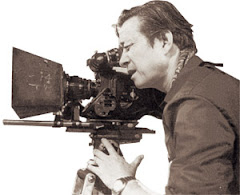Monday, July 6, 2009
Homeless Angels
First of all, I would like to apologize for not posting this as a comment, but I have a feeling this will be a long and somewhat tedious review (sorry Steven, I know myself too well), and I'm afraid of character limits.
I was thoroughly impressed with the quality of the film. As Steven himself commented afterwards, there were specific camera shots, for example, that I thought were quite sophisticated. The only one that comes to my mind immediately is the first shot (or one of the earlier shots) of the restaurant, as the camera slowly and smoothy swept across the room from a relatively high point. The shot effectively showed the atmosphere of the restaurant at a glance, although admittedly there was some..bartender(?) whose hand motions were a little too distracting.
I thoroughly enjoyed how well the story plots and the characters wove together, with no particular loose ends. Except, of course, for the character of the wife of the good man (I forget his name). At first, she was clearly presented as someone who resented her husband's efforts to help the homeless boys. As her own brother admitted, she had a limited compassion. However, after that interesting character development(?), she faded from view and stuck to a passive role as a caring mother to all the boys. There was no transition from the disgruntled, unwilling woman to the strangely passive and compassionate mother to the "boys." I did not like that. If you create a mother who defies the traditional image of a caring mother and a passive wife, then there must be a reason. Or, at least, you must keep her true to that character in order to make her memorable. Perhaps this is the result of poor or necessary editing, but that doesn't excuse this relatively small but significant oversight for me.
Another character I took some interest in was Myung-ja, the sister of Yong-gil. She did not seem particularly interesting to me at all until the point when she revealed to her brother that she wanted to train to be a doctor. Although this career path was probably suggested and set by the doctor himself, I found it interesting that the girl was breaking traditional boundaries by working towards a relatively ambitious career, rather than staying as a nurse. It showed a kind of independence and feminism that I found surprising and rather pleasing. (Also, it made me wonder if it was typical of Korean culture at the time -- I think Steven mentioned that it was typical in the movies, but not in the actual world.) This is another reason why I was disappointed in the lack of development -- or, at least, continuity -- in the mother's character; the film's slightly unorthodox female characters interested me.
I also enjoyed the individual personalities that were gven to the doctor, Yong-pal, Yong-gil, and Il-nam. (I personally think Il-nam is adorable for doing what he did.) However, I found the good man's character to be a little flat and too one-dimensional. He was simply a man with pity for the homeless boys, nothing more. I thought a little explanation of why he was so particularly fixated on helping the boys -- and why just boys? -- would have been nice, though perhaps not necessary.
The film had awkward transitions of the background music, but I assume this was due to technological limitations, not the director's poor taste.
Finally, though I have more to say, I will wrap up with one more point. I thought the pledging-to-the-Japanese-flag scene was a little too random in the movie. When Steven asked the class what genre of film this was, I was tempted to answer, "a family film." Because as far as I can tell, this movie was all about, as either the doctor or the good man said himself (again, I don't remember), "honesty, courage, and love." It was a feel-good film, with just enough comedy, drama, and familial love to make a great family entertainment. Also, I thought the film could also be interpreted as a satire (but then again anything can be interpreted as a satire), by showing how so much of the society was decadent, and how so many kids were out in the streets without aid. In either case, the pledging-of-loyalty-to-the-Japanese-empire scene does not fit with the theme of the movie.
If anyone made it through my entire post alive, I offer you my congratulations. And pity.
Subscribe to:
Post Comments (Atom)

No comments:
Post a Comment